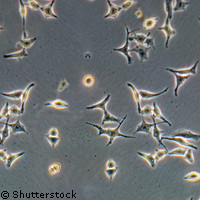Stakeholders call for Europe-wide action on cervical cancer
Members of the European and national parliaments, health ministers and representatives of cancer associations and patient groups gathered in the European Parliament on 22 January to pledge their support to the STOP Cervical Cancer campaign. At the heart of the initiative is a petition which calls on the European institutions national governments to implement effective cervical cancer prevention programmes across Europe and establish public health education programmes to ensure all women are able to take advantage of screening services available to them. The petition was launched last year by the European Cervical Cancer Association (ECCA) and the International Union Against Cancer (UICC). It aims to take advantage of a clause of the EU's new Lisbon Treaty under which the Commission must act if requested to do so by a petition of over a million European citizens. At the time of writing, the petition has over 109,000 signatories. Among other things, the petition calls on politicians to 'support independent research to establish the most appropriate means to implement new screening methods and vaccination against the Human Papillomavirus (HPV) to ensure the greatest reductions in cervical cancer across Europe'. '[Cervical cancer] is an area where research really has bought benefits,' Imelda Read, the President of ECCA, told CORDIS News. The most significant breakthrough in recent years has been the development of a vaccine against strains 16 and 18 of HPV, which between them cause around 70% of cervical cancer cases. The vaccine is now available in many countries where it is being given to girls before they become sexually active and at risk of exposure to the virus which causes the cancer. According to Ms Read, the effectiveness of the vaccine has also grabbed the attention of researchers investigating other diseases such as dengue fever. Meanwhile, the drug companies which developed the vaccines are working on extending their coverage to other strains of the virus. As current vaccines do not offer protection against all strains of the virus, the ECCA recommends that all women continue to attend screening appointments regularly. Most women are infected with HPV at some point in their lives. Dr Davies told CORDIS News that more research is needed to understand why some women are able to clear the virus from their system and others do not. 'What is the mechanism for this?' he asked. Slovenia's Health Minister, Zofija Mazej Kukovic, signed the petition at the ceremony in Brussels. Reducing the burden of cancer is one of Slovenia's priorities for its presidency of the EU. 'Cancer has been and remains one of the most serious public health issues in all Member States,' she said, noting that as Europe's population ages, rates of the disease are likely to rise. 'Cancer is a European issue,' she added. The good news is that the overwhelming majority of cervical cancer cases in Europe could be prevented. The bad news is that just eight European countries (Finland, Iceland, Italy, the Netherlands, Norway, Slovenia, Sweden and the UK) have set up well-organised cervical cancer screening programmes, leaving many women vulnerable to the disease. Furthermore, even in countries where prevention programmes exist, many women do not take advantage of them. 'Both these problems can be solved by increasing awareness; politicians need to be made aware of the benefits these programmes will bring so they prioritise their implementation and women need to be made aware of the benefits so they access the programmes,' explained Dr Philip Davies, Director General of ECCA. 'The STOP Cervical Cancer petition is a great way to do this.' The Brussels event is just one of a series of events taking place across Europe to mark the second Cervical Cancer Prevention Week.



